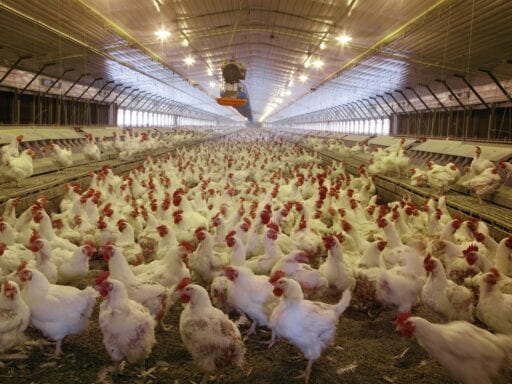A “recovering poultry grower” explains why he gave up factory farming.
Craig Watts describes himself as a “recovering poultry grower.”
In 1992, he saw a newspaper ad looking for farmers to raise chicks into slaughter-ready chickens, and he considered the option. He already had a long-standing family farm in North Carolina, but he’d still have to invest a lot of money upfront— $200,000 to build two massive barns that would house thousands of chicks. As he remembers it, a representative from a big poultry company came out to convince him, and promised him positive cash flow, profits to pay off the buildings, and plenty of support.
“Those are the three biggest lies I ever heard,” he says.
Watts quickly found himself deep in debt. His contracts were short, and in order to keep getting them, he’d often need to make expensive upgrades that only added to his debt burden.
He was paid according to a tournament system. There was a base rate of pay, but the company would take the weights of his birds, look at how much grain the chickens ate and a couple of other factors, and rank his performance against all the other farmers in the area using an algorithm he had no access to. The highest-ranked farmers made more, and the lowest-ranked farmers made less.
The National Chicken Council, a trade association representing the interests of the chicken industry to Congress and federal agencies, defends this system, saying it rewards farmers for high performance and incentivizes them. But Craig was a high-performing farmer, and he was still frustrated with the system. He says it was hard to control his performance because he had no control over the feed or the chicks he got. He even documented instances where he received very sick chicks.
And he had few options. For many years, Craig remembers, there was only one poultry company in his area, so he couldn’t try to get a better deal elsewhere.
So in 2010, Craig Watts decided to fight back — even though speaking up potentially put him at financial risk. He would participate in a series of workshops that the Justice Department held, under the Obama administration, to gather evidence about problems in contract livestock raising.
On this episode of the Future Perfect podcast, Watts and Leah Douglas, a reporter for the Food and Environment Reporting Network, explain the arguments that were made in those workshops, the hopes they raised in farmers like Watts — and why they failed to make much of a difference in the end. Subscribe to the Future Perfect podcast on Apple Podcasts, Google Podcasts, Spotify, Stitcher, or wherever you get your podcasts.
Further reading
- In his book The Meat Racket, Christopher Leonard outlines the problems with contract poultry growing in much more depth, and goes into the history of the practice.
- Leah Douglas and Christopher Leonard also did a recent, in-depth investigation into problems with the US chicken industry’s treatment of farmers.
- You can watch the DOJ public workshops for yourself, or read transcripts, all available here.
- The National Chicken Council has compiled an FAQ that pushes back on claims that poultry growers have problems
This podcast is made possible thanks to support from Animal Charity Evaluators. They research and promote the most effective ways to help animals.
Millions turn to Vox each month to understand what’s happening in the news, from the coronavirus crisis to a racial reckoning to what is, quite possibly, the most consequential presidential election of our lifetimes. Our mission has never been more vital than it is in this moment: to empower you through understanding. But our distinctive brand of explanatory journalism takes resources. Even when the economy and the news advertising market recovers, your support will be a critical part of sustaining our resource-intensive work. If you have already contributed, thank you. If you haven’t, please consider helping everyone make sense of an increasingly chaotic world: Contribute today from as little as $3.
Author: Byrd Pinkerton
Read More



